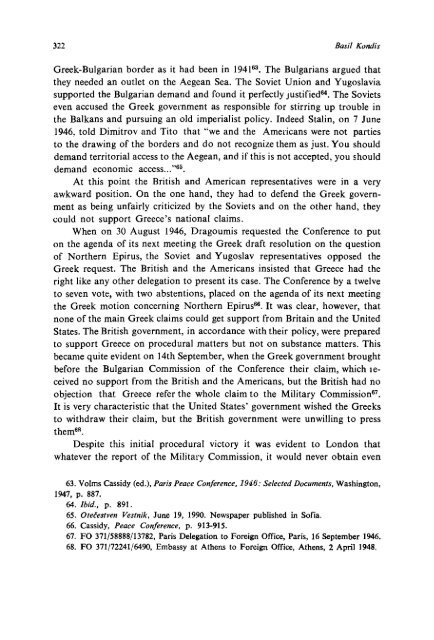2488-4976-1-SM
You also want an ePaper? Increase the reach of your titles
YUMPU automatically turns print PDFs into web optimized ePapers that Google loves.
322 Basil Kandis<br />
Greek-Bulgarian border as it had been in 194163. The Bulgarians argued that<br />
they needed an outlet on the Aegean Sea. The Soviet Union and Yugoslavia<br />
supported the Bulgarian demand and found it perfectly justified64. The Soviets<br />
even accused the Greek government as responsible for stirring up trouble in<br />
the Balkans and pursuing an old imperialist policy. Indeed Stalin, on 7 June<br />
1946, told Dimitrov and Tito that “we and the Americans were not parties<br />
to the drawing of the borders and do not recognize them as just. You should<br />
demand territorial access to the Aegean, and if this is not accepted, you should<br />
demand economic access...”65.<br />
At this point the British and American representatives were in a very<br />
awkward position. On the one hand, they had to defend the Greek government<br />
as being unfairly criticized by the Soviets and on the other hand, they<br />
could not support Greece’s national claims.<br />
When on 30 August 1946, Dragoumis requested the Conference to put<br />
on the agenda of its next meeting the Greek draft resolution on the question<br />
of Northern Epirus, the Soviet and Yugoslav representatives opposed the<br />
Greek request. The British and the Americans insisted that Greece had the<br />
right like any other delegation to present its case. The Conference by a twelve<br />
to seven vote, with two abstentions, placed on the agenda of its next meeting<br />
the Greek motion concerning Northern Epirus66. It was clear, however, that<br />
none of the main Greek claims could get support from Britain and the United<br />
States. The British government, in accordance with their policy, were prepared<br />
to support Greece on procedural matters but not on substance matters. This<br />
became quite evident on 14th September, when the Greek government brought<br />
before the Bulgarian Commission of the Conference their claim, which îeceived<br />
no support from the British and the Americans, but the British had no<br />
objection that Greece refer the whole claim to the Military Commission67.<br />
It is very characteristic that the United States’ government wished the Greeks<br />
to withdraw their claim, but the British government were unwilling to press<br />
them68.<br />
Despite this initial procedural victory it was evident to London that<br />
whatever the report of the Military Commission, it would never obtain even<br />
63. Volms Cassidy (ed.), Paris Peace Conference, 1946: Selected Documents, Washington,<br />
1947, p. 887.<br />
64. Ibid., p. 891.<br />
65. Otečestven Vestnik, June 19, 1990. Newspaper published in Sofia.<br />
66. Cassidy, Peace Conference, p. 913-915.<br />
67. FO 371/58888/13782, Paris Delegation to Foreign Office, Paris, 16 September 1946.<br />
68. FO 371/72241/6490, Embassy at Athens to Foreign Office, Athens, 2 April 1948.


